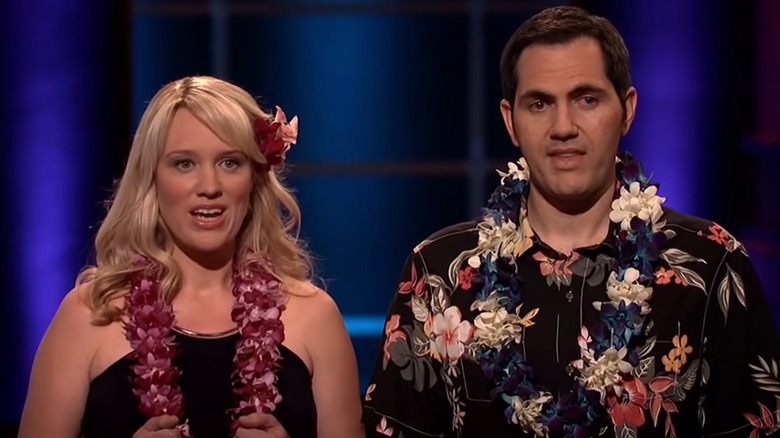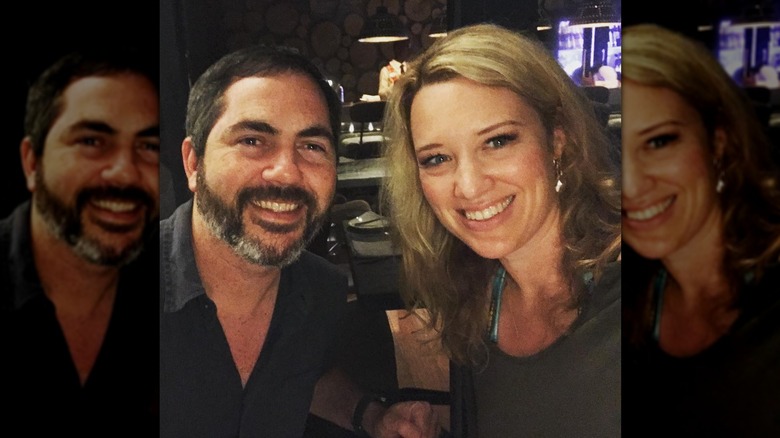Here's What Went Down With Honeyfund After Shark Tank
If you're planning a wedding, or have ever planned a wedding, you may have heard of Honeyfund. The online wedding registry company allows betrothed couples to set up savings for a honeymoon, allowing them to add money like a piggy bank and their guests to be able to send cash for their travels over buying physical gifts.
The company was founded by couple Josh and Sara Margulis back in 2006 after they found they wanted their friends and family to donate toward their honeymoon, but didn't have an easy online platform to do so. "We had this dream of honeymooning somewhere exotic and far away like Fiji to get away from the stress of two full-time jobs. But we didn't have the funds after paying for our own wedding," Sara explained to Forbes. "We created a makeshift wish list for the costs associated with our Fiji honeymoon — things like excursions, resort nights, island hopping flights, etc. Our wedding guests overwhelmed us with more than $5,000 in contributions, but more importantly, they loved the idea. They asked us to make something like it for other couples. That's how Honeyfund was born." But after some early success, Sara and Josh knew they'd need more funding to make the company as big as it could be. Which is where the idea of appearing on "Shark Tank" came in.
Robert Herjavec, Barbara Corcoran, and Kevin O'Leary all wanted to invest in Honeyfund
Honeyfund became somewhat of a "Shark Tank" darling during Season 6. Josh Margulis and Sara Margulis' episode aired in 2014 and saw them head into the Tank (in Hawaiian-inspired attire) asking for $400,000 in exchange for a 10% stake in the business. The twosome got right in with the numbers after explaining their business idea, telling the Sharks they had already made a $217,000 profit.
But that wasn't enough to convince Lori Greiner, who explained she thought the market was too crowded and declared herself out. Mark Cuban also wasn't the biggest fan of the whole concept. He told the entrepreneurs that he didn't think the couple had enough of a plan to make the business as big as it could be.
But Robert Herajvec, Kevin O'Leary, and Barbara Corcoran were intrigued. So much so, that they put their money where their mouths were. Herjavec actually offered the two $500,000, but he wanted half of the business in return. Kevin O'Leary then came in hot, claiming he would give the couple $400,000 in return for a third of their transaction revenue until he got $1.2 million back. Corcoran then offered the two $400,000 for 30% of their business. And that sparked even more of a bidding war. Herjavec came down to match Corcoran's offer, but after the Margulis couple asked if he would dip to 25%, he refused. The couple actually ended up cutting a deal with O'Leary.
Honeyfund saw great success with Kevin O'Leary onboard
Speaking about why she and Josh Margulis opted to partner with Kevin O'Leary, Sara Margulis told Success, "Our long-range goal is to one day sell the company for $10 million, $50 million — maybe $100 million. The 30% that Robert [Herjavec] or Barbara [Corcoran] wanted would amount to a lot more than the $1.2 million we'd be paying back to Kevin." And it seems like partnering up with Mr. Wonderful certainly worked for the business. Following the airing of their "Shark Tank" episode on ABC, Honeyfund received an average of 5,000 website visitors per day (up from 150). The business then expanded to create a Spanish version of its website, Fondo de Miel — Honeyfund en español. "Our 'Shark Tank' appearance and the deal with Kevin O'Leary launched us onto the national stage. This drove a lot more traffic and members, but it also brought us the notoriety to form high-level partnerships, such as our registry integration with Target," Sara explained to Forbes.
And the entrepreneur credited much of that success to teaming up with O'Leary. "One of the biggest challenges has been competing in a very crowded space and Kevin has helped us stand out," Sara said. With O'Leary onboard, the twosome's staff count rose to 10 people, and they created a new business development department.
Honeyfund has helped couples get $1 billion towards their trips
As of November 2023, Honeyfund is definitely still in business and pulling in some big bucks. The Honeyfund website is still up and running in English and Spanish and proudly states that it has helped betrothed couples be gifted a very impressive $1 billion over the years. The website has also expanded its services beyond just being a money pot, as it now offers couples travel deals, money for their dream trip, as well as offering up wedding tips. The company has also gone through crowdfunding stages since appearing on "Shark Tank." In 2021, the company raised over $1.07 million to continue growing the business. The following year, the company crowdfunded again, with its Start Engine page confirming more than $476,000 was invested from almost 900 investors.
It's no surprise then that Honeyfund has some big numbers behind it. By June 30, 2022, Honeyfund's 2021 year-to-date Gross Marketplace Volume (GMV) was $49.25 million, and its aggregate H1 2022 revenues had increased to 257% when compared to the year prior. The outlet also revealed that the website had been used by more than 1.1 million couples, with the company's valuation sitting at $39.33 million. Not bad at all!
Sara Margulis has ideas for Honeyfund even without Kevin O'Leary's help
It sounds like Honeyfund won't be slowing down anytime soon. Sara Margulis told Success that she has all sorts of ideas for how the company can expand — even without the help of Kevin O'Leary should he ever decide to step away. "We're excited to imagine all kinds of outcomes for the company. Kevin is a great partner to have should it ever come time to sell!" she shared.
According to Josh Margulis' LinkedIn, he stepped away from the business in 2019 to become a senior software engineer at NS8 Inc. Up until April 2023, he worked as a contracted senior product manager at Silicon Publishing, Inc., but doesn't have a current position listed. As for Sara, her LinkedIn confirms she's still the full-time CEO at Honeyfund.
Sara opened up about some of her plans for the business to Medium in 2022, explaining how its niche can keep growing. "We are adding life-long funding capability to Honeyfund so family and friends can support couples throughout their love-filled lives — from milestones to mishaps and everything in between. We're changing the crowdfunding paradigm from being event-focused to being people-focused," she explained. "We're helping to invest in the American family, something that is sorely needed today. We've even opened up shares of the company to the public so they can be part of our vision and growth." So, it sounds like Honeyfund will be around for years to come.


